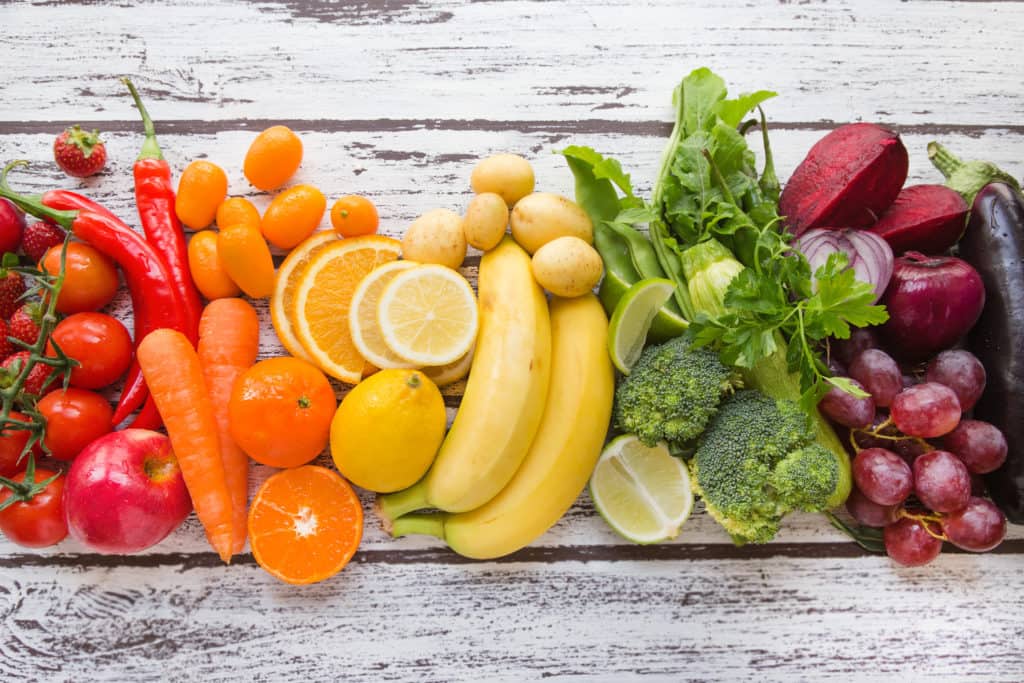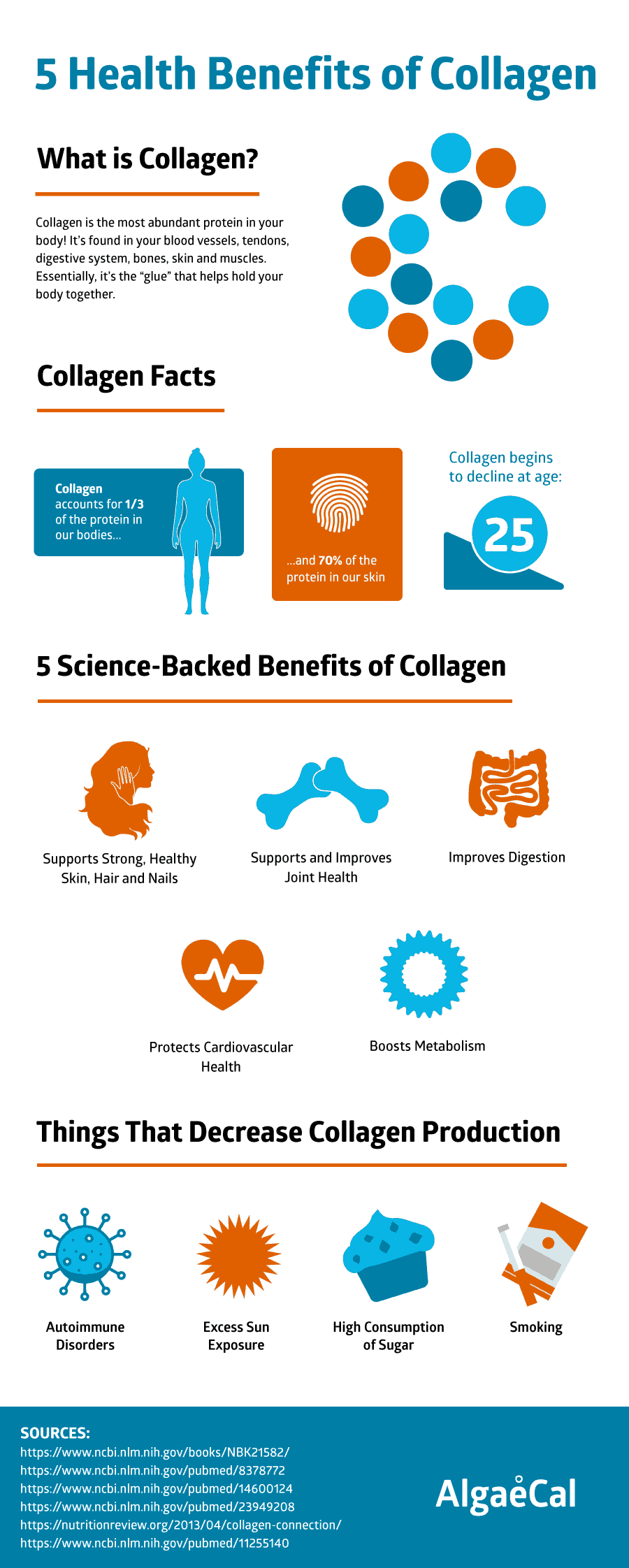Collagen Type 2 With Vitamin C
If you're a vegetarian, you know that going meat-free isn't always easy.
Whether it's finding vegetarian options when eating out or answering questions from non-vegetarians – it can be exhausting!
So what about collagen?
The good news is, you don't actually have to eat animal products to fulfill your collagen needs. There are plenty of vegetarian options that promote healthy collagen production.
What is Collagen?
Within your body are connective tissues. Connective tissues are exactly what their name implies – tissues that connect things. Fascia tissue, dermis (the bottom layer of your skin), muscles, tendons, cartilage and the tissue surrounding your hair and nails are all prime examples of connective tissue.
Collagen is the main protein of all connective tissue. It is insoluble, meaning it's not broken down by water, and fibrous in shape like strands of thread. The human body has so much collagen that it accounts for roughly one-third of a healthy human's body!
In fact, it makes up 70% of the protein in our skin.
Fortunately, the human body is well-designed and makes its own collagen when consistently given the nutrients it needs to do so.
Collagen, like all proteins, is made up of building blocks called amino acids, which are properly structured with the help of vitamin C. Think of amino acids like Lego pieces and vitamin C like your brilliant grandchild who can build the entire castle set with only one glance at the instructions.

Without Vitamin C There Is No Collagen
Without vitamin C, collagen production is disrupted and can result in a wide variety of problems throughout the body.
Vitamin C deficiency, although uncommon in North America, results in your bones being unable to properly manufacture collagen and its connective tissues. The body literally falls apart as collagen is broken down and not replaced. This results in joints beginning to wear down as your tendons weaken.
Unfortunately, humans are unable to produce vitamin C on their own and must rely on food and supplements as a source.
The best food sources of vitamin C have one thing in common: they are all plant foods. Most animals are able to make vitamin C in their bodies, but only plants are able to make it concentrated enough to provide a rich source when eaten.
Vitamin C rich foods include oranges, red peppers, kale, and broccoli. You can also find vitamin C supplements in stores, or added to other vitamin and mineral complexes.
Types of Collagen
There are 16 known types of collagen, but over 90% of all collagen is type I, II, or III – numbered in order of discovery.
While collagen's overall function is the same in every tissue, to accommodate stretching of each tissue, the collagen shape depends on the type of tissue. Regardless of its placement and type, all collagen have an incredible tensile strength (resistance to breaking under tension). Let's look at some more common collagen types:

Type I:
The most common type of collagen in humans and the most abundant protein in our bodies overall. Type I collagen is an important component of bones, teeth, skin, ligaments, tendons, cartilage (especially the disks between vertebrae) and even scar tissue. It also comprises 85% of the collagen in our tendons, with the other 15% made up of type III collagen. Collagen type I and type III are often found together, with type I being the predominant collagen in the tissue.

Type II:
Think of this type of collagen as the strong, support collagen. Its job is to give tensile strength to both articular (found as supportive tissues in the ears, nose, trachea, larynx, and smaller respiratory tubes) and hyaline (found covering the articular surfaces of bones in synovial joints) cartilage, as well as the eye. Type II collagen is of great benefit for age-related joint pain or other symptoms.

Type III:
Usually found with type I collagen. Primarily found in lining tissues such as intestinal walls, blood vessel walls and within the muscle. That's why a type III collagen deficiency is linked to higher risk of ruptured blood vessels.

Type IV:
Plays an important role in forming basal lamina, a gelatinous-like fluid secreted by the epithelial cells. Think of epithelial cells as cells that outline organs. The outer layer of skin that outlines your entire body is made up of epithelial cells and thus called your epithelium. Below any layer of epithelial cells is dermis, a type of tissue that is designed to act as a cushion for the organ it surrounds. Between these two layers is the basal lamina that provides padding to the epithelial layer and is needed for nerve and blood vessel functions.

Type V:
Type V collagen is a misunderstood collagen. It tends to be found working in conjunction with types I and III. It's found to be part of the matrix within tissues like bone, and the interstitial (between tissue) matrix of muscle tissue, hepatic (liver) tissue, lung tissue, and the placenta in pregnant women.

Type X:
Research is still being done to see the exact mechanisms by which type X collagen works, but what is known is that type X has a role in bone formation and cartilage. It is found in fetal and juvenile growth plates, ribs and vertebrae. It's also been found to help bone fracture healing.
5 Health Benefits of Collagen
While collagen is most frequently mentioned in the beauty industry, its benefits are beyond skin deep:
Supports Strong, Healthy Hair, Skin and Nails
There is no shortage of products and procedures claiming to be the magic elixir for beautiful, youthful skin, luxurious hair, and beautiful long, strong nails. For the most part, there is next to no research backing up those claims, with the exception of collagen. Collagen has been shown in clinical studies to improve skin elasticity, moisture, and retention. In others, collagen has been found to help regrow hair and improve the rate of skin wound healing.
Improves Digestion
Your intestinal tract can become stressed from any of the following: psychological stress; physical stress; side effects of certain medications; bacterial and/or fungal infections; exposure to dietary allergens; and/or ingestion of toxins. This stress can cause the tissue in your intestinal tract to become damaged, inflamed and irritated- and when paired with unhealthy microflora- creates a condition called leaky gut syndrome. This is where toxins, pathogens, and other matter pass through the intestinal tract and make their way into the bloodstream and then other tissues in the body. Studies have found that people with Inflammatory Bowel Disease (IBD) have decreased blood serum concentrations of collagen. Supplementation of collagen and consumption of collagen from foods helps soothe, seal and repair the intestinal tract.

Want to share this on your blog? - Copy and paste the code below.
Protects Cardiovascular Health
The production of collagen requires vitamin C and the amino acids proline and lysine. However, so does the production of arterial plaque! If the body is using vitamin C, proline and lysine to make collagen in the body, it decreases the amount available to create plaque. In this way, supporting healthy collagen production helps support cardiovascular health. Additionally, collagen gives blood vessels their elasticity and thus a decrease in collagen would lead to hardening of the arteries. (All the more reason to give the body what it needs for healthy collagen production.)
Boosts Metabolism
Collagen is essentially the glue that holds our tissues together. Increasing collagen in tissue not only helps create a healthier structure for the tissue itself but in the case of muscle, it increases muscle mass. Muscle, especially skeletal muscle, burns more calories than any other tissue in the body. An increase in muscle mass increases the rate of metabolism to support the tissue. Healthy, increased collagen production means a healthy increase in muscle mass and thus an increase in metabolism.
Supports and Improves Joint Health
Collagen is beneficial for joints as it concentrates where they meet and where the connective tissue binds together. Oral supplementation of collagen has been found to be absorbed in the intestinal tract and incorporated into cartilage tissue in the joints. In a small study focusing on individuals with rheumatoid arthritis (RA), collagen supplementation was found to significantly reduce swelling and pain in joints. In fact, 4 of the 60 participants experienced remission of their condition during the 3-month study, hinting that collagen supplementation may be an effective supplement for individuals with RA.
Vegetarian Food Sources That Increase Collagen Production
If you don't eat meat or animal products, you can still increase your collagen production. A smart way for vegetarians and vegans to support collagen production is to eat fruits and vegetables plentiful in collagen-boosting nutrients.
As we've mentioned throughout this article, collagen is abundant in the body and acts as the vital glue holding our bodies together. With such a vital function, the body prioritizes collagen production. Although collagen production slows as we age, it never stops, and if you supply your body the proper nutrition to make healthy collagen, the age-related decline isn't as notable or severe.
On that note, the following nutrients support collagen production, especially from these top vegetarian food sources:
| Nutrient Name | Top Vegetarian Food Sources | Measurement Amount | Nutrient Amount |
|---|---|---|---|
| Proline (amino acid) | Swiss Cheese Mustard Seed Milk, Dry- Non-Fat Egg White, Dried | 100g 100g 100g 100g | 3690 mg 2800mg 3500 mg 3153 mg |
| Vitamin C (vitamin) | Broccoli Papaya Kiwi Fruit Kale Red Peppers | 100g 100g 100g 100g 100g | 89.2 mg 60.9 mg 92.7 mg 41 mg 128 mg |
| Anthocyanin (flavonoid) | Elderberries Chokeberries Eggplant Black Raspberries Blueberries | 100g 100g 100g 100g 100g | 1993 mg 2147 mg 750 mg 845 mg 529 mg |
| Copper (trace mineral) | Raw Kale Mushrooms, Shiitake Sesame Seeds Cashews Dried Prunes | 100g 100g 100g 100g 100g | 1.5 mg 0.9 mg 4.08 mg 2.22 mg 0.61 mg |
| Lysine (amino acid) | Tofu Kidney Beans Black Beans Tempeh Quinoa | 100g 100g 100g 100g 100g | 450 mg 595 mg 608 mg 905 mg 239 mg |
| Arginine (amino acid) | Tofu Kidney Beans Black Beans Tempeh Quinoa | 100g 100g 100g 100g 100g | 1250 mg 537 mg 549 mg 1250 mg 340 mg |
| Vitamin A (vitamin) | Dried Apricots Cooked Carrots Cooked Kale Butternut Squash, Cooked Sweet Potatoes | 100g 100g 100g 100g 100g | 12669 IU 17033 IU 13621 IU 11155 IU 19218 IU |
| Manganese (trace mineral) | Lima Beans Hazelnuts Pumpkin Seeds Tofu Whole Grain Bread | 100g 100g 100g 100g 100g | 1.3 mg 5.6 mg 4.9 mg 1.2 mg 2.1 mg |
| Zinc (mineral) | Wheat Germ Pumpkin Seeds Cashews Cocoa Powder Cooked Chickpeas | 100g 100g 100g 100g 100g | 16.7 mg 10.3 mg 5.6 mg 6.8 mg 1.5 mg |
- Proline: Proline and hydroxyproline are amino acids that make up 23% of collagen, and have been found to be precursors to sustaining collagen production. Indeed, they play a key role in the stability of collagen. Vegetarian proline sources include asparagus, beans, buckwheat, cabbage, chives, cucumbers, garbanzo beans, peanuts, soy, and watercress.
- Vitamin C: Vitamin C adds a hydroxyl group (-OH) to the amino acids in collagen which allows the acids to turn into a well-formed, strong helix shape. In other words, vitamin C adds oxygen and hydrogen to amino acids so that they can do their part in collagen production. If you don't get enough vitamin C, your collagen production will slow. Vitamin C is found in abundance in many fruits and vegetables such as broccoli, brussel sprouts, cauliflower, citrus fruits, kale, kiwi, mango, papaya, peppers, pineapple, and strawberries.
- Anthocyanin: One of the prominent features of anthocyanins is its ability to suppress inflammation and stabilize collagen (in rat studies). It does so by preventing free radical damage, which inhibits enzymes from clinging to collagen. Anthocyanins are found in blackberries, blueberries, cherries, and raspberries.
- Copper: Copper has been found to upregulate collagen (especially types I, II and V) and elastin, meaning it increases either the production or utilization of collagen and elastin, as well as helps facilitate creating the fibril structure of these collagens. Copper can be found in vegetarian sources like sunflower seeds, lentils, almonds, apricots, dark chocolate, mushrooms, greens and blackstrap molasses.
- Lysine: Lysine is an essential amino acid, meaning your body can't make it, so you must get it from foods. Lysine is used in making collagen and protects collagen from enzymatic breakdown. It has also been found to help prevent the loss of bone mineral density, due to its ability to increase intestinal calcium absorption. Lysine is found in meat, poultry, fish, eggs and dairy products. Parmesan cheese contains particularly high amounts of lysine, as does tofu. Vegetarian sources of lysine, in addition to tofu, include brewer's yeast and spirulina.
- Arginine: or L-arginine is an amino acid made in the body. Some studies have suggested that arginine stimulates insulin-like-growth factor-l (IGF-1) production and collagen synthesis in osteoblast-like cells. Basically, arginine makes the bone cells responsible for making new bone (osteoblasts) more active. Some of the top sources of L-arginine include eggs, sesame seeds, spirulina, coconut meat, cultured yogurt, kefir and raw cheeses.
- Vitamin A: Vitamin A helps stimulate the production of collagen and is only found in animal-derived foods (in its complete, active form called retinol). Fruits and veggies are, on the other hand, are high in phytonutrients called carotenoids (precursors of vitamin A), which the body must then must convert to vitamin A. The best sources of vitamin A are meats including liver, beef, cheeses and egg yolks. Vegetarian sources that are high in beta-carotene, which your body must then convert to vitamin A to utilize, are apricots, broccoli, carrots, kale, squash and sweet potatoes.
- Manganese: Manganese increases production of collagen and elastin by increasing the enzyme responsible for proline formation, especially when healing wounds. Vegetarian food sources of manganese include leafy vegetables, nuts, pineapple, seaweed and other sea vegetables, and whole grains.
- Zinc: Zinc is a cofactor in collagen production, meaning it activates the proteins responsible for making collagen. The richest source of zinc is oysters, but other zinc-rich foods are meat, poultry, fish and dairy products. Vegetarian sources of zinc are predominantly seeds, nuts, and beans.
Collagen and Bone Health
Let's take a closer look at the link between collagen and your bones. It's most commonly known that collagen keeps our skin elastic and plump looking, but its benefits go much deeper than that– bone-deep, in fact. Collagen is actually found everywhere in our bodies: our muscles, bones, and skin cells. It's the most abundant protein in our bodies.
Your bones are made of protein and minerals, and 90% of bone matrix proteins are made of collagen. In fact, the combination of calcium and collagen is responsible for giving our bones strength and flexibility, which helps minimize stress dissolving your bones.
Here's the frustrating thing though – as we age, our ability to produce collagen diminishes.
Collagen and Calcium Are Essential for Bone Strength
Bone is, after all, a connective tissue. Typically we think of bone as a physical support for the rest of our body, which it is, but it's also a connective tissue.
Both collagen and calcium are responsible for the strength of your bones. And besides the obvious strength of your bones, there's another way your bones are strong– they are flexible. Being flexible allows the bone to bend instead of break in many instances, and to absorb an impact rather than fracture. That flexibility is thanks to collagen!
While it's important to get enough calcium for overall bone health, it's vital to support healthy collagen production too. All of this becomes even more important if you've already developed osteopenia or osteoporosis. And if you add a vegan or vegetarian diet into the mix, you must be even more vigilant.
Lysine and arginine, in particular, are important for bone metabolism and growth, which we discussed above.
Eating foods high in lysine and arginine will help spur on collagen production. So getting both of these amino acids from your diet is a good start. Technically there is no official recommended dosage specifically for lysine or arginine, but recent research suggests older adults may need to consume around 1.2 grams of protein per kilogram of body weight. For more information on protein intake and how to calculate your specific needs, visit our "Everything You Need to Know About Protein and Bone Health."
Whilst there are lysine and arginine supplements out there, we suggest organic whole food sources first – your body will absorb these better, and you'll get a whole bunch of other nutrients too. The best plant sources of arginine and lysine are listed above in our chart.

What Damages Collagen?
Collagen production declines as we age, however, a healthy diet and lifestyle can significantly mitigate that decline.
Excess sun exposure, chronic high consumption of sugar, and smoking all accelerate collagen decline and actually damage collagen. What's more, while autoimmune disorders aren't avoidable, poor management of the condition can hasten the decline in collagen production and damage existing collagen.
- Excess Sun Exposure (UV Rays): In an attempt to get that summer glow on your skin, you may be damaging the collagen within your skin that provides the tight, youthful appearance. UV light, both from sun and tanning beds, increases abnormal elastin, which in turn leads to an enzymatic reaction that breaks down collagen. Opt for a little bit of sun as opposed to an hour or more, and stay away from tanning beds for a variety of health purposes.
- Chronic High Consumption of Sugar: Excess sugar binds to protein to make something called a glycosylated protein, a molecule that is very sharp. Proteins near the glycosylated protein get damaged, including collagen, which can become brittle.
- Smoking: Smoking is known to do a lot of damage to the human body and collagen doesn't escape its destruction. The chemicals in smoked tobacco products damage both collagen and elastin throughout the body.
- Autoimmune Disorders: These are medical disorders where the immune system sees a normal part of the body as a threat, and attacks it. Some autoimmune disorders directly affect collagen, while in other cases the outcome of unmanaged or poorly managed autoimmune disorders can lead to collagen damage.
How to Prevent Diminishing Collagen Levels
A healthy diet and lifestyle will go a long way in promoting collagen production – and your best bet to combat the natural decline that happens with age!
This makes it difficult to rely on your body's ability alone to keep up with your collagen needs. But the good news is that collagen can be taken in through food sources too.
Taking in collagen through food sources will help support your skin, your internal organs and also the collagen that makes up the connective tissues of your bones.
By incorporating more of the foods mentioned above, along with calcium, will help strengthen your bones.
However, if you're interested in an "all-in-one" plant-based source to stimulate collagen- and provide enough calcium and trace minerals to increase bone density- you should try AlgaeCal Plus and Strontium Boost.
AlgaeCal Plus is a plant-sourced calcium that contains up to 80% of your Daily Value of vitamin C. It's also formulated in perfect balance with magnesium and the 13 trace minerals your bones need to increase bone density. And because it comes from rare sea algae, the minerals have already been broken down and converted into a useable form that your body recognizes as food, making it highly absorbent and bio-available.
Strontium Boost takes your bone building potential to the next level when combined with AlgaeCal Plus. The two are formulated to work together perfectly, as a team, to increase bone density.
How many of you follow a vegetarian or vegan diet? Share your thoughts – and favorite collagen promoting food sources in the comments below.
Collagen Type 2 With Vitamin C
Source: https://www.algaecal.com/expert-insights/vegetarians-guide-protein-collagen-healthy-bones/

0 Komentar